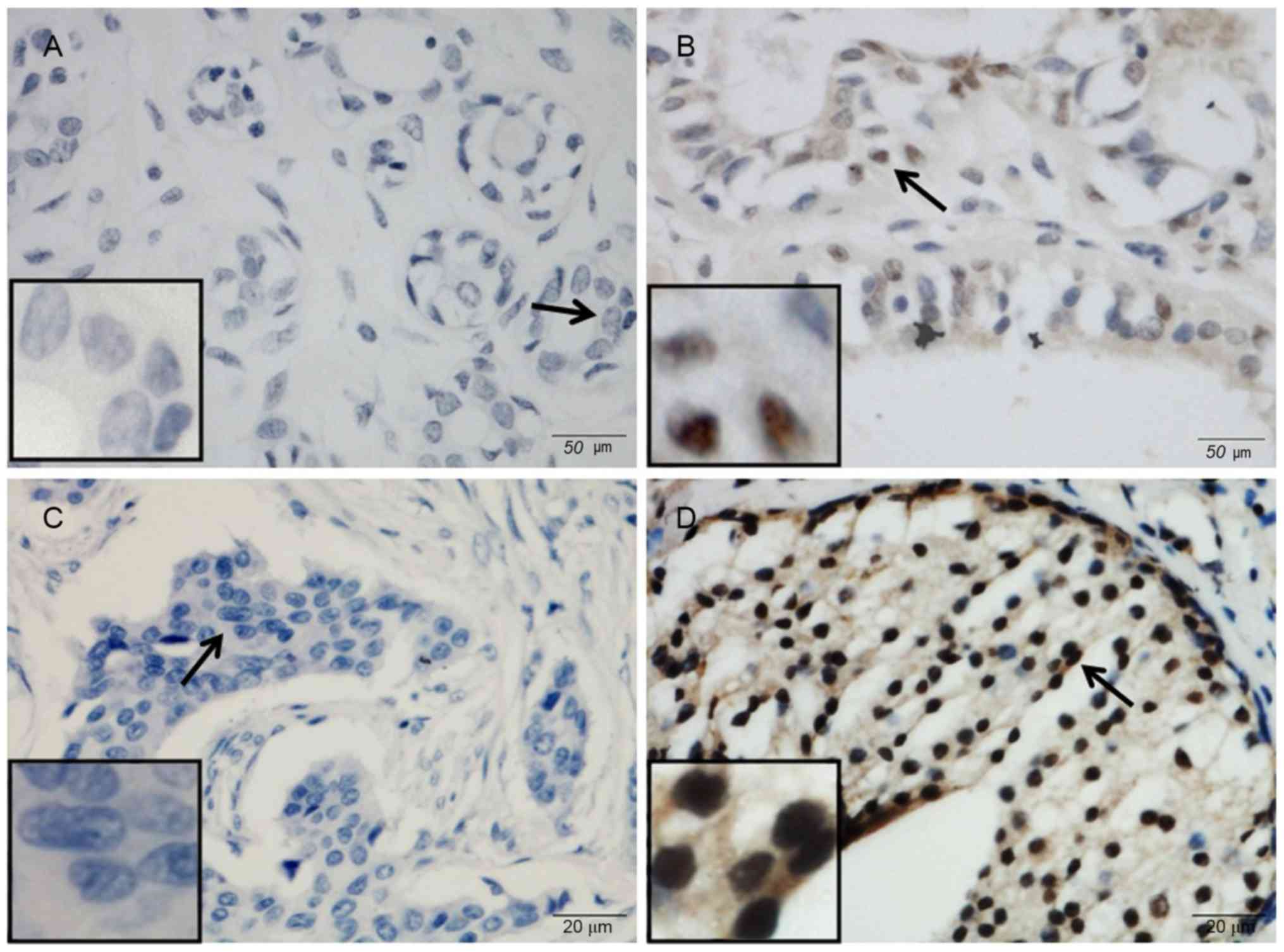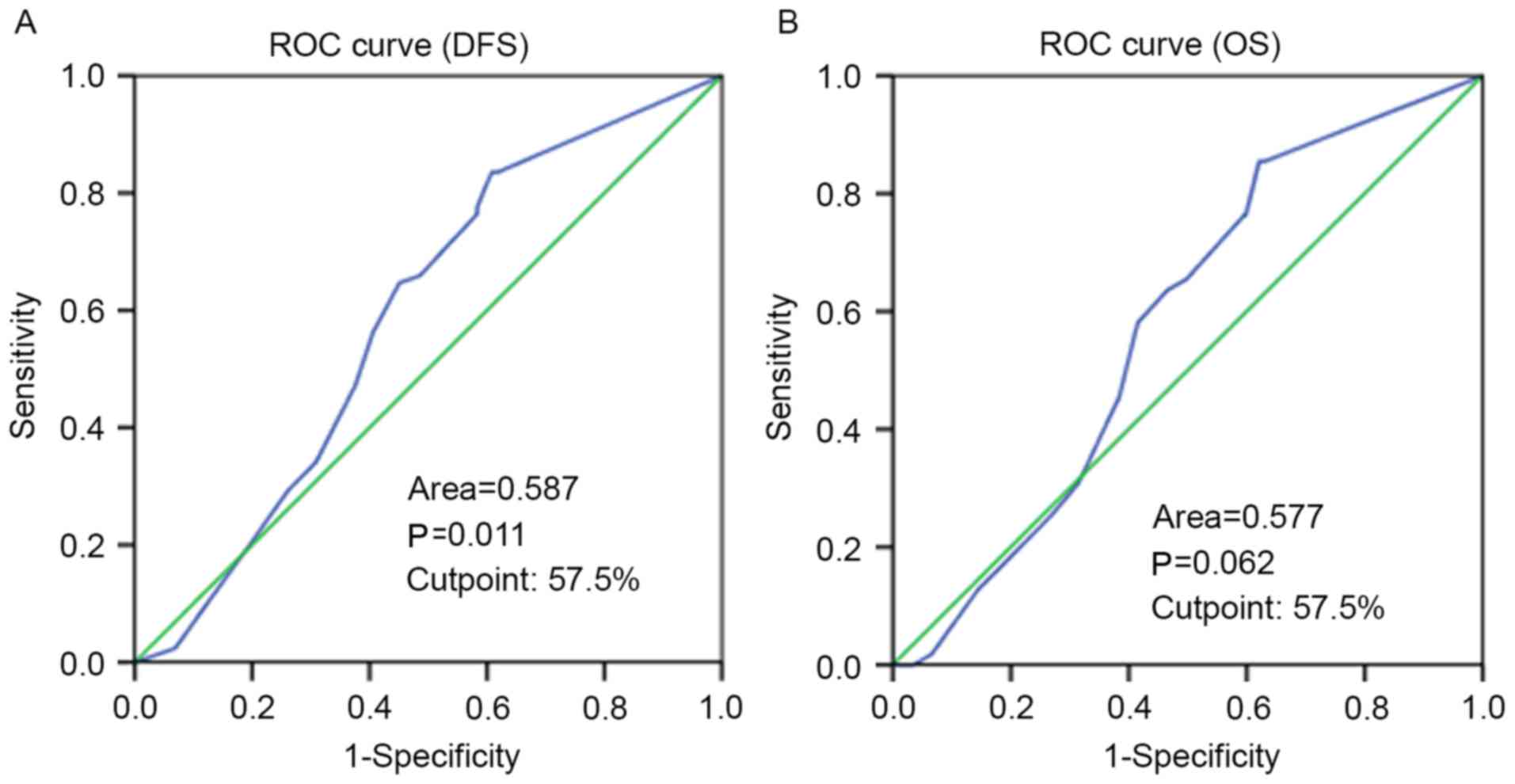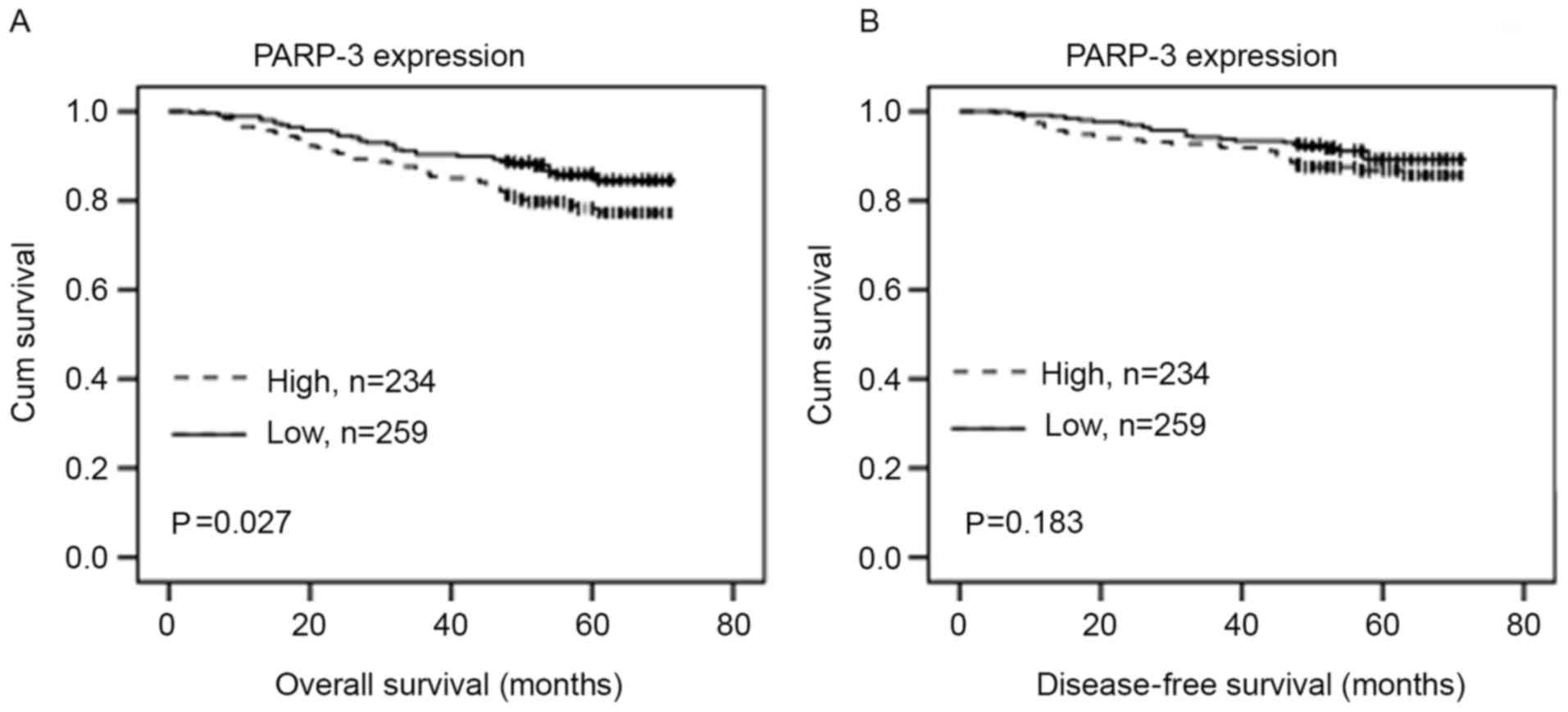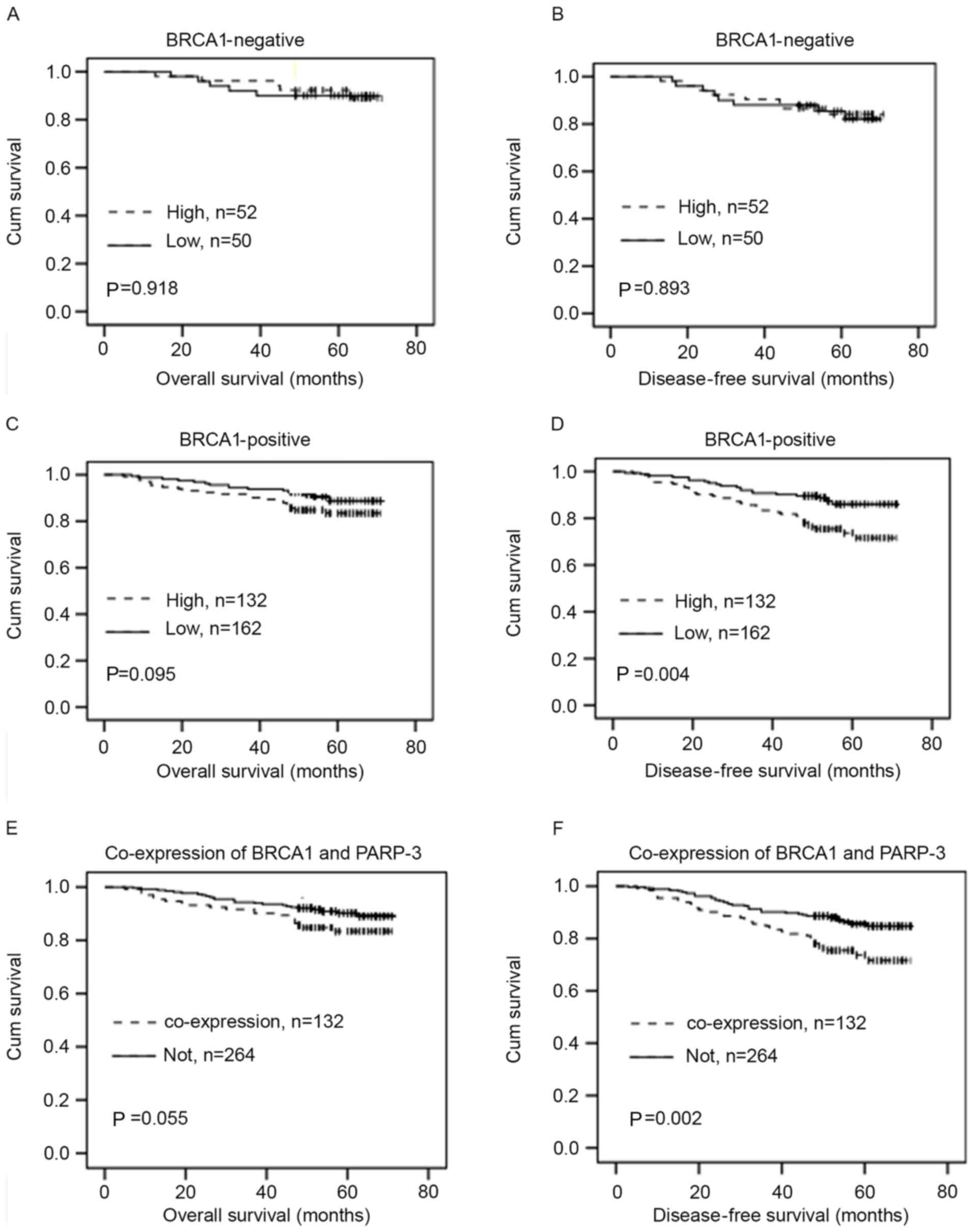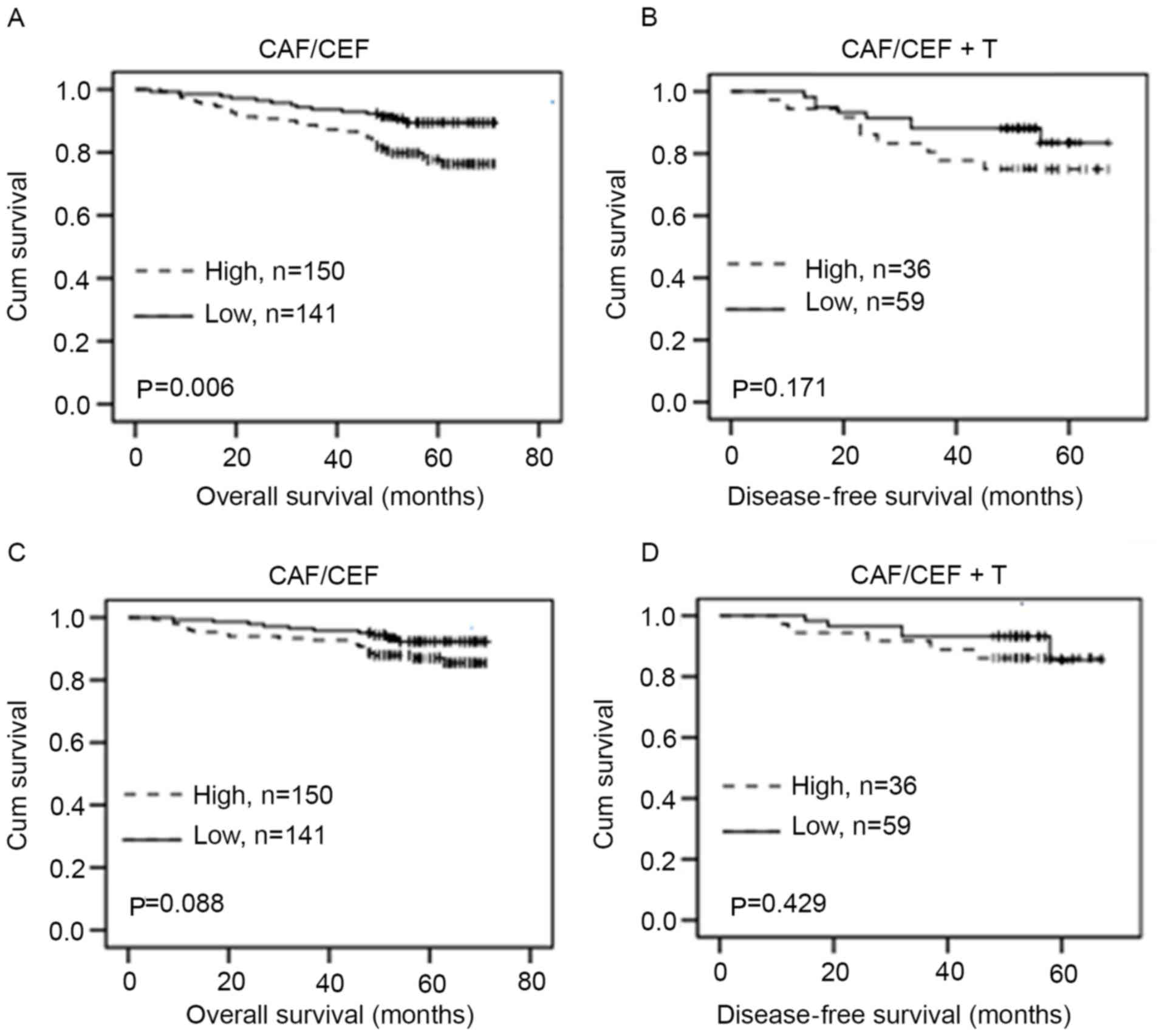|
1
|
Bertucci F and Birnbaum D: Reasons for
breast cancer heterogeneity. J Biol. 7:62008. View Article : Google Scholar : PubMed/NCBI
|
|
2
|
Patani N, Martin LA and Dowsett M:
Biomarkers for the clinical management of breast cancer:
International perspective. Int J Cancer. 133:1–13. 2013. View Article : Google Scholar : PubMed/NCBI
|
|
3
|
Hakmé A, Wong HK, Dantzer F and Schreiber
V: The expanding field of poly(ADP-ribosyl)ation reactions.
‘Protein modifications: Beyond the usual suspects’ review series.
EMBO Rep. 9:1094–1100. 2008. View Article : Google Scholar : PubMed/NCBI
|
|
4
|
Hottiger MO, Hassa PO, Lüscher B, Schüler
H and Koch-Nolte F: Toward a unified nomenclature for mammalian
ADP-ribosyltransferases. Trends Biochem Sci. 35:208–219. 2010.
View Article : Google Scholar : PubMed/NCBI
|
|
5
|
Megnin-Chanet F, Bollet MA and Hall J:
Targeting poly(ADP-ribose) polymerase activity for cancer therapy.
Cell Mol Life Sci. 67:3649–3662. 2010. View Article : Google Scholar : PubMed/NCBI
|
|
6
|
Cepeda V, Fuertes MA, Castilla J, Alonso
C, Quevedo C, Soto M and Pérez JM: Poly(ADP-ribose) polymerase-1
(PARP-1) inhibitors in cancer chemotherapy. Recent Pat Anticancer
Drug Discov. 1:39–53. 2006. View Article : Google Scholar : PubMed/NCBI
|
|
7
|
Boehler C and Dantzer F: PARP-3, a
DNA-dependent PARP with emerging roles in double-strand break
repair and mitotic progression. Cell Cycle. 10:1023–1024. 2011.
View Article : Google Scholar : PubMed/NCBI
|
|
8
|
Miwa M and Masutani M:
PolyADP-ribosylation and cancer. Cancer Sci. 98:1528–1535. 2007.
View Article : Google Scholar : PubMed/NCBI
|
|
9
|
Shimizu S, Nomura F, Tomonaga T, Sunaga M,
Noda M, Ebara M and Saisho H: Expression of poly(ADP-ribose)
polymerase in human hepatocellular carcinoma and analysis of biopsy
specimens obtained under sonographic guidance. Oncol Rep.
12:821–825. 2004.PubMed/NCBI
|
|
10
|
Staibano S, Pepe S, Lo Muzio L, Somma P,
Mascolo M, Argenziano G, Scalvenzi M, Salvatore G, Fabbrocini G,
Molea G, et al: Poly(adenosine diphosphate-ribose) polymerase 1
expression in malignant melanomas from photoexposed areas of the
head and neck region. Hum Pathol. 36:724–731. 2005. View Article : Google Scholar : PubMed/NCBI
|
|
11
|
Brustmann H: Poly(adenosine
diphosphate-ribose) polymerase expression in serous ovarian
carcinoma: Correlation with p53, MIB-1, and outcome. Int J Gynecol
Pathol. 26:147–153. 2007.PubMed/NCBI
|
|
12
|
Rojo F, García-Parra J, Zazo S, Tusquets
I, Ferrer-Lozano J, Menendez S, Eroles P, Chamizo C, Servitja S,
Ramírez-Merino N, et al: Nuclear PARP-1 protein overexpression is
associated with poor overall survival in early breast cancer. Ann
Oncol. 23:1156–1164. 2012. View Article : Google Scholar : PubMed/NCBI
|
|
13
|
Ossovskaya V, Koo IC, Kaldjian EP, Alvares
C and Sherman BM: Upregulation of Poly(ADP-Ribose) Polymerase-1
(PARP1) in triple-negative breast cancer and other primary human
tumor types. Genes Cancer. 1:812–821. 2010. View Article : Google Scholar : PubMed/NCBI
|
|
14
|
O'Shaughnessy J, Osborne C, Pippen JE,
Yoffe M, Patt D, Rocha C, Koo IC, Sherman BM and Bradley C:
Iniparib plus chemotherapy in metastatic triple-negative breast
cancer. N Engl J Med. 364:205–214. 2011. View Article : Google Scholar : PubMed/NCBI
|
|
15
|
Fong PC, Boss DS, Yap TA, Tutt A, Wu P,
Mergui-Roelvink M, Mortimer P, Swaisland H, Lau A, O'Connor MJ, et
al: Inhibition of poly(ADP-ribose) polymerase in tumors from BRCA
mutation carriers. N Engl J Med. 361:123–134. 2009. View Article : Google Scholar : PubMed/NCBI
|
|
16
|
Tutt A, Robson M, Garber JE, Domchek SM,
Audeh MW, Weitzel JN, Friedlander M, Arun B, Loman N, Schmutzler
RK, et al: Oral poly(ADP-ribose) polymerase inhibitor olaparib in
patients with BRCA1 or BRCA2 mutations and advanced breast cancer:
A proof-of-concept trial. Lancet. 376:235–244. 2010. View Article : Google Scholar : PubMed/NCBI
|
|
17
|
De Vos M, Schreiber V and Dantzer F: The
diverse roles and clinical relevance of PARPs in DNA damage repair:
Current state of the art. Biochem Pharmacol. 84:137–146. 2012.
View Article : Google Scholar : PubMed/NCBI
|
|
18
|
Langelier MF, Riccio AA and Pascal JM:
PARP-2 and PARP-3 are selectively activated by 5′ phosphorylated
DNA breaks through an allosteric regulatory mechanism shared with
PARP-1. Nucleic Acids Res. 42:7762–7775. 2014. View Article : Google Scholar : PubMed/NCBI
|
|
19
|
Boehler C, Gauthier LR, Mortusewicz O,
Biard DS, Saliou JM, Bresson A, Sanglier-Cianferani S, Smith S,
Schreiber V, Boussin F and Dantzer F: Poly(ADP-ribose) polymerase 3
(PARP3), a newcomer in cellular response to DNA damage and mitotic
progression. Proc Natl Acad Sci USA. 108:2783–2788. 2011.
View Article : Google Scholar : PubMed/NCBI
|
|
20
|
Bieche I, Pennaneach V, Driouch K, Vacher
S, Zaremba T, Susini A, Lidereau R and Hall J: Variations in the
mRNA expression of poly(ADP-ribose) polymerases, poly(ADP-ribose)
glycohydrolase and ADP-ribosylhydrolase 3 in breast tumors and
impact on clinical outcome. Int J Cancer. 133:2791–2800.
2013.PubMed/NCBI
|
|
21
|
Bansal C, Pujani M, Sharma KL, Srivastava
AN and Singh US: Grading systems in the cytological diagnosis of
breast cancer: A review. J Cancer Res Ther. 10:839–845. 2014.
View Article : Google Scholar : PubMed/NCBI
|
|
22
|
Cowherd SM: Tumor staging and grading: A
primer. Methods Mol Biol. 823:1–18. 2012. View Article : Google Scholar : PubMed/NCBI
|
|
23
|
Fang Y, Wei J, Cao J, Zhao H, Liao B, Qiu
S, Wang D, Luo J and Chen W: Protein expression of ZEB2 in renal
cell carcinoma and its prognostic significance in patient survival.
PLoS One. 8:e625582013. View Article : Google Scholar : PubMed/NCBI
|
|
24
|
Zhu W, Cai MY, Tong ZT, Dong SS, Mai SJ,
Liao YJ, Bian XW, Lin MC, Kung HF, Zeng YX, et al: Overexpression
of EIF5A2 promotes colorectal carcinoma cell aggressiveness by
upregulating MTA1 through C-myc to induce
epithelial-mesenchymaltransition. Gut. 61:562–575. 2012. View Article : Google Scholar : PubMed/NCBI
|
|
25
|
Khanna KK and Jackson SP: DNA
double-strand breaks: Signaling, repair and the cancer connection.
Nat Genet. 27:247–254. 2001. View
Article : Google Scholar : PubMed/NCBI
|
|
26
|
Goncalves A, Finetti P, Sabatier R,
Gilabert M, Adelaide J, Borg JP, Chaffanet M, Viens P, Birnbaum D
and Bertucci F: Poly(ADP-ribose) polymerase-1 mRNA expression in
human breast cancer: A meta-analysis. Breast Cancer Res Treat.
127:273–281. 2011. View Article : Google Scholar : PubMed/NCBI
|
|
27
|
Chapman JR, Taylor MR and Boulton SJ:
Playing the end game: DNA double-strand break repair pathway
choice. Mol Cell. 47:497–510. 2012. View Article : Google Scholar : PubMed/NCBI
|
|
28
|
Rulten SL, Fisher AE, Robert I, Zuma MC,
Rouleau M, Ju L, Poirier G, Reina-San-Martin B and Caldecott KW:
PARP-3 and APLF function together to accelerate nonhomologous
end-joining. Mol Cell. 41:33–45. 2011. View Article : Google Scholar : PubMed/NCBI
|
|
29
|
Fenton AL, Shirodkar P, Macrae CJ, Meng L
and Koch CA: The PARP3- and ATM-dependent phosphorylation of APLF
facilitates DNA double-strand break repair. Nucleic Acids Res.
41:4080–4092. 2013. View Article : Google Scholar : PubMed/NCBI
|
|
30
|
Zhang J: The role of BRCA1 in homologous
recombination repair in response to replication stress:
Significance in tumorigenesis and cancer therapy. Cell Biosci.
3:112013. View Article : Google Scholar : PubMed/NCBI
|
|
31
|
Prakash R, Zhang Y, Feng W and Jasin M:
Homologous recombination and human health: The roles of BRCA1,
BRCA2, and associated proteins. Cold Spring Harb Perspect Biol.
7:a0166002015. View Article : Google Scholar : PubMed/NCBI
|
|
32
|
Willis NA, Chandramouly G, Huang B, Kwok
A, Follonier C, Deng C and Scully R: BRCA1 controls homologous
recombination at Tus/Ter-stalled mammalian replication forks.
Nature. 510:556–559. 2014. View Article : Google Scholar : PubMed/NCBI
|
|
33
|
Beck C, Boehler C, Barbat Guirouilh J,
Bonnet ME, Illuzzi G, Ronde P, Gauthier LR, Magroun N, Rajendran A,
Lopez BS, et al: PARP3 affects the relative contribution of
homologous recombination and nonhomologous end-joining pathways.
Nucleic Acids Res. 42:5616–5632. 2014. View Article : Google Scholar : PubMed/NCBI
|
|
34
|
Casorelli I, Bossa C and Bignami M: DNA
damage and repair in human cancer: Molecular mechanisms and
contribution to therapy-related leukemias. Int J Environ Res Public
Health. 9:2636–2657. 2012. View Article : Google Scholar : PubMed/NCBI
|
|
35
|
Wang Q and Wieder R: All-trans retinoic
acid potentiates Taxotere-induced cell death mediated by Jun
N-terminal kinase in breast cancer cells. Oncogene. 23:426–433.
2004. View Article : Google Scholar : PubMed/NCBI
|
|
36
|
Mhaidat NM, Wang Y, Kiejda KA, Zhang XD
and Hersey P: Docetaxel-induced apoptosis in melanoma cells is
dependent on activation of caspase-2. Mol Cancer Ther. 6:752–761.
2007. View Article : Google Scholar : PubMed/NCBI
|
|
37
|
Kolfschoten GM, Hulscher TM, Duyndam MC,
Pinedo HM and Boven E: Variation in the kinetics of caspase-3
activation, Bcl-2 phosphorylation and apoptotic morphology in
unselected human ovarian cancer cell lines as a response to
docetaxel. Biochem Pharmacol. 63:733–743. 2002. View Article : Google Scholar : PubMed/NCBI
|















